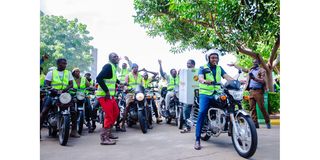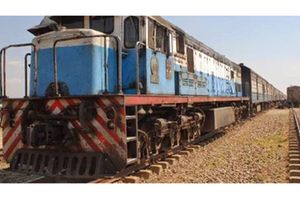Tanzania unveils digital address app to boost transport, security

Minister for Information, Communication, and Information Technology, Jerry Silaa showcases the functionality of the NaPA system while riding a motorbike during the celebration in Dodoma. PHOTO | COURTESY
What you need to know:
- The NaPA system is a game-changer in our transport sector in that it will make it easier for drivers to locate passengers with pinpoint accuracy, reducing travel time and improving security
Dar es Salaam. Tanzania has taken a major step in digital transformation with the launch of the National Physical Addressing System (NaPA)’s mobile application that aims to revolutionise transportation services while strengthening security for drivers and passengers.
Speaking at the launch event in Dodoma on February 8, 2025, the minister for Information, Communication and Information Technology, Jerry Silaa, emphasised the role of the new system in making travel more efficient and safe.
“The NaPA system is a game-changer in our transport sector. It will make it easier for drivers to locate passengers with pinpoint accuracy, reducing travel time and improving security,” Minister Silaa said while addressing Bodaboda and Bajaji operators in Dodoma during the National Address Week celebrations.
The NaPA mobile application uses geolocation technology, allowing passengers to input their home or business address into the system.
Once a ride is requested, drivers can use the app to reach the exact location without confusion or delays.
This innovation is expected to significantly improve navigation in urban and rural areas, where informal addressing systems have long made it difficult for drivers to locate passengers.
“Even if you are new to Dodoma or any other city, NaPA will guide you directly to your customer’s doorstep,” Minister Silaa assured drivers.
One of the key benefits of the system is its role in improving safety for both drivers and passengers.
By ensuring that all transactions are logged within the app, cases of passengers or drivers getting lost, scammed, or attacked will be significantly reduced.
Chairman of the Dodoma Motorcycle Riders Association (UMAPIDO), Marwa Nyagake, welcomed the initiative, noting that it would enhance their daily operations.
“This system will make our work easier and safer. We no longer have to guess locations or ask strangers for directions, which sometimes puts us at risk,” Mr Nyagake stated.
Security experts have also hailed the move, saying digital address systems have been successful in reducing crime in other countries. Director General of the ICT Commission, Dr Nkundwe Mwasaga, emphasised the importance of digital identification in modern economies.
“In today’s digital era, reliable location data is critical. Many developed countries use such systems to ensure safe and efficient service delivery. Tanzania is now joining this movement, and it will greatly enhance our transport sector,” Dr Mwasaga said.
Countries like Kenya, India, and Rwanda have successfully implemented digital address systems, leading to a transformation in ride-hailing services and emergency response.
In Kenya, the integration of digital addresses in taxi-hailing apps like Bolt and Uber has reduced response times and improved customer satisfaction. In India, digital address systems have been used to enhance e-commerce and delivery services, ensuring parcels reach the right destinations.
Rwanda’s Smart Kigali initiative, which included the introduction of digital addresses, has made it easier for ride-sharing services and emergency responders to operate efficiently in urban areas.
The introduction of the NaPA system is part of a larger effort by the Tanzanian government to accelerate digital transformation across various sectors. In recent years, Tanzania has embraced technological solutions in governance, banking, healthcare, and agriculture.
Minister Silaa urged digital innovators to build on the NaPA system to create more solutions that will enhance service delivery across the country.
“This is just the beginning. We encourage more tech innovators to develop applications that will make life easier for Tanzanians. Addressing systems are essential in today’s digital economy,” he said.
As Tanzania moves towards a more digital future, the NaPA system is set to play a critical role in improving transport efficiency, security, and overall urban planning.





